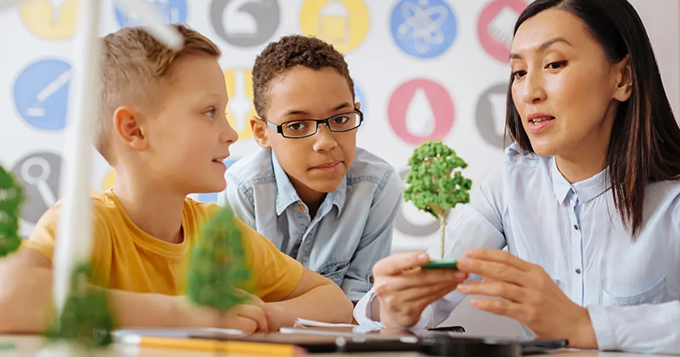
Climate change is the most urgent crisis facing our planet today. Youth have repeatedly called for action on tackling this crisis, including improved climate change education.
Yet despite the many pledges made at high-profile world conferences to implement climate change curricula in all schools, the follow through has been far from satisfactory.
The federal government, as a signatory of the Paris Agreement, a landmark treaty signed by 194 governments to mitigate climate change, must follow through with its commitment to enhance climate change education. But to do this, they need to ask for accountability from each province and territory.
Without formal assistance from school board directors, superintendents and trustees advocating for accountability and taking action at the local level, climate change education will never become a priority.
Improving sparse and inconsistent approaches
Canadian students are among those demanding improvement to the sparse and inconsistent delivery of climate change education.
Research published in 2019 found that only about half of Canada’s ministries of education and about 60 per cent of school divisions in Canada had sustainability-specific policy, with this understood to include governance, curriculum, facilities and operations, research, and community outreach.
When climate change topics are taught, key concepts are often missing such as the scientific consensus that humans are causing climate change, or a focus on impacts or solutions.
General knowledge gaps
A recent countrywide survey of 4,035 respondents across the country conducted by Learning for a Sustainable Future (LSF) and Leger highlighted the consequences of inadequate climate change education in schools.
One-third of Canadians failed a 10-question knowledge quiz. Only around half knew greenhouse gases were the main cause of climate change. Few responded correctly that the average temperature has already increased by more than one degree Celsius.
Despite their gaps in knowledge, the majority of survey respondents agreed that we are experiencing a climate emergency and that climate change education should be a high priority.
Ten percent of survey respondents were educators (406 people), and among this group, half of said a lack of time is a barrier when attempting to include climate change education within the classroom.
Professional learning opportunities
Research from the B.C. Council for International Cooperation, a coalition of international development organizations, notes that implementing climate change education in Canadian schools cannot continue to fall on the shoulders of overburdened teachers.
Climate change education has not been a priority for governments, teacher education programs or school districts, so perhaps it is not surprising that the LSF and Leger nationwide survey also found that only one-third of educators felt that they have the knowledge and skills needed to teach about climate change.
Changes in teacher education
The Association of Canadian Deans of Education, a group of deans from university faculties or schools of education across the country, recently launched an Accord on Education for a Sustainable Future to address the gap in climate change education in teacher preparation programs.
The accord signals some much needed progress, yet it is not a legally binding document.
This is disappointing, as properly trained teachers would have a far-reaching impact on students’ actions to mitigate the effects of a warming planet.
Empowering students to act
The traditional way of teaching doesn’t work for complex topics like climate change. Teachers need to shift towards student-directed inquiry and active, real-world learning.
It’s not enough to simply quote scientific facts, as a focus on “doom and gloom” can intensify eco-anxiety. Best practices for climate change education include the opportunity to take personal and collective action.
Safe and inclusive spaces need to be created that allow time for discussion on how climate change is linked to social justice and contentious political issues. Not surprisingly, many educators feel overwhelmed and unprepared to take on this challenge.
Policy changes needed
Teacher eco-champions at many schools struggle due to lack of support and barriers faced from fellow teachers or principals. Research has also documented how school-related policy makes it difficult for teachers to innovate.
Where teachers lack staff, board or ministry support, some still try to integrate climate change learning in their classrooms.
Teachers turn to organizations like Climate Atlas of Canada, Earth Rangers, GreenLearning, or LSF to find lesson plans, funding for action projects or school-wide eco-challenges.
The Our Canada Project, which emerged from youth ideas and is a project of LSF, showcases a variety of student sustainability initiatives such as growing biodiversity gardens, sourcing green energy or fighting fast fashion. However, student eco-action projects need to become widespread in every school.
Boards declare climate emergencies
Some school boards have declared a climate emergency.
But a declaration on paper alone isn’t enough – boards need to follow through with policies that target action at the classroom level.
One positive example is the Rainbow District School Board, the largest public school board in Northern Ontario with programs in Sudbury, Espanola and Manitoulin Island.
This board declared a climate emergency in 2019 and created a climate change action plan that mandated all schools implement sustainability initiatives. These included board-wide monthly eco-challenges.
School boards can’t wait
All students deserve to have an education that helps them address real-world issues and threats.
There is help for school boards to make a commitment to climate change education. Some innovative districts have already begun to support board-wide engagement in programs such as EcoSchools or Sustainable Future Schools, or have created their own climate change action plan.
If our education systems don’t step up, the question that young people will ask in the future won’t be why adults did nothing to stop climate change. They will ask: “Why didn’t anyone teach us about climate change in school, so that we could learn to take on this challenge ourselves?”
Author Bio: Karen S. Acton is a Lecturer, Educational Leadership and Policy, OISE at the University of Toronto
